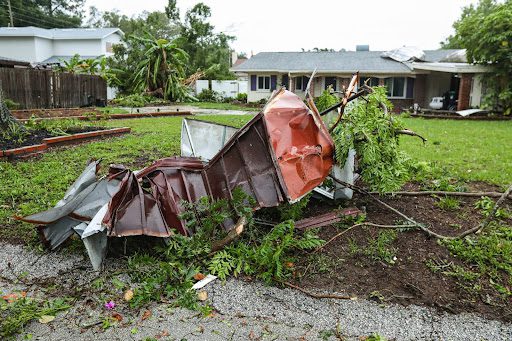THE DIFFERENCE BETWEEN A HOME WARRANTY AND HOMEOWNERS INSURANCE


In the process of buying a new home, your real estate agent might suggest asking the seller to provide a home warranty as part of the deal. However, your lender has already informed you that you will be required to obtain a homeowners insurance policy as a stipulation of your mortgage agreement. At first, the thought of a warranty and an insurance policy might seem redundant.
Your home is probably one of your biggest investments, with home prices steadily soaring to new heights recently. As a result, you’ll want to ensure that your house is protected against accidents and hazards that could threaten it. Knowing that your home is covered will give you peace of mind and assurance. But you are already paying for homeowner’s insurance, so what would be the point of an additional home warranty? While the distinction between the two might be somewhat ambiguous, home insurance and a home warranty actually serve two different purposes.
If you are a homeowner or soon-to-be homeowner, it is important to understand the difference between insurance and a warranty for your house. While most mortgage lenders require homeowners insurance, a home warranty is an additional product that many people overlook. Your insurance will cover damage and loss. However, your home warranty will cover the bulk of the repair cost for home systems and failed appliances. A home warranty may even assist with the replacement cost of items that fail. In general, your insurance and your warranty work to complement each other and provide solid protection for your home and investment.

Whenever you make a large purchase, such as a new TV or another large electronic device, you are usually offered a warranty at the time of purchase. These guarantees protect the device against damage and defects and promise to repair or replace the item if something happens. Additionally, when you purchase a vehicle, you will get a standard manufacturer’s warranty that covers certain parts of the car against damage and wear and tear. Think of your home warranty the same way you think of the warranties for your devices and your car. It is a policy that helps with the costs of service and repair of designated systems and home appliances in your home. A home warranty assists you if something unexpectedly fails due to defects, wear and tear, or other related issues.
A home warranty is an optional product that may be offered to a home buyer as an incentive in a real estate deal. It could also be purchased by a homeowner at any time. Like other warranties that you receive, a home warranty generally lasts for a predetermined period of time. Depending on your plan, you might have the option of paying in full or making monthly payments. All of our plans at AFC Home Warranty come with the option of personalizing your payment options.
Usually, the cost of coverage for home warranty plans will vary depending on what you need to be covered. Some plans offer basic coverage for home systems only, while others cover appliances, systems, and other items. As with most things, the more extensive the home warranty plan, the more you will pay for coverage. All of the AFC Home Warranty plans offer a range of coverages at affordable prices for any budget.
In general, the mechanical systems and appliances in your home have an expected lifespan. As an example, most experts agree that your HVAC system should last around 20 years. With proper care and maintenance, however, you can usually extend the life of your appliances and systems beyond what is expected. Over time, though, wear and tear and other circumstances will cause malfunctions and breakdowns. If you need any appliance repair or system service, you may be on the hook for a significant bill. This is where your warranty home protection plan comes into play. A solid home warranty reduces the risk of getting hit with a budget-crushing bill for repairs or service.
Think of your home protection plan as an emergency fund that steps in to help with the costs of unexpected issues. Most home warranties offer coverage for appliances like the dishwasher, refrigerator, water heater, and clothes dryer. Typically, all of your kitchen appliances and other major machines and equipment can be covered by a home warranty. Aside from this, your home warranty company will also cover your air conditioner, furnace, electrical system, plumbing system, and ductwork. You can also purchase additional coverages that will help with your septic system, swimming pool, roof leak repairs, and other items. Comprehensive home warranty plans cover a wide range of items to provide you with maximum protection.
AFC Home Warranty offers four plans that provide options for coverage of your major home systems and home appliances, as well as important home comforts. We also offer additional coverage to protect your sump pump, septic system, central vacuum, pool and spa, stand-alone freezer, and roof leaks. AFC’s flexible coverage offers a plan for every budget.

Once you purchase a home warranty, you are covered in the event of a breakdown or malfunction. If a covered item breaks, the homeowner should file service requests with the home warranty company to have service or repairs completed as soon as possible. In most cases, a qualified contractor or service technician will be dispatched in 24 to 48 hours to assess the issue. The technician will repair the problem as quickly as possible to get you back on track.
Depending on your coverage limits and plan details, you will likely have to pay a service call fee. You will pay a fee directly to the contractor or technician during a service appointment. No matter what the issue is or what work needs to be completed, the fee will be the same for each service based on your warranty contract. Based on your plan, AFC lets you choose your service fee in amounts ranging from $75 to $125. The service fee you choose will impact the cost of your plan.
While a home warranty protects many mechanical items in your home, your homeowners insurance is a policy that protects your home and your personal belongings. Similar to other types of insurance, a homeowners policy protects you against financial loss from an unexpected event. Your insurance policy will step in to provide for repairs in the event of things like a fire, storm, theft, vandalism, or another catastrophe beyond your control. A home insurance policy will also step in if an accident on your property leads to bodily injury.
Like other insurance policies, you will pay a monthly premium for homeowners coverage and will have a predetermined deductible if you file a claim. The cost of your home insurance plan will vary based on numerous factors, including the home’s location, square footage, and age. You can usually reduce the amount you pay for coverage by installing certain safety features like alarms, cameras, and fencing.
In general, mortgage companies, banks, and other financial institutions that offer home loans want to ensure that their investment in your property is secure. As a result, an adequate homeowners insurance policy is usually required as long as the loan is outstanding. When the home is paid off, the requirement no longer exists. However, many homeowners maintain active coverage on their houses because of the risk of home-related perils.

Homeowners insurance varies depending on the type of coverage. A policy with named perils is basic coverage that provides financial protection in the event of things like fire, theft, wind, hail, or vandalism. On the other hand, an all-risk policy offers more broad coverage with few exclusions. These policies tend to be more expensive but offer more coverage.
In general, a home insurance policy will cover the structure of your home or dwelling, any buildings, or other structures on your property. The policy will also protect your personal property like furniture, jewelry, and electronics. While your homeowners insurance will usually cover things like water damage or roof damage from natural disasters, damage from flooding, earthquakes, and pests is generally not covered by a standard policy. A homeowner would need to purchase additional coverage to be protected for those perils.
While your homeowners insurance is in place to provide financial protection, it can’t be used to cover a washing machine that decides to stop working. Your home warranty covers issues with mechanical equipment and home appliances, while your home insurance shields your home. If you have an issue covered by your insurance policy, you will follow the same steps as you would if you were in a vehicle accident.
If you experience damage to your home, you will file a claim with your insurer. Typically, the insurance company will send out an adjuster to evaluate the damage and approve the repairs. Once you take care of any deductibles or other fees that are owed, your insurance company will cover the additional costs for repairs. Depending on your insurance policy and company, the contractor may receive a direct payment, or a check could be issued to you to cover the costs.
As we have discussed, if you have a mortgage on your home, you are likely required to have a valid home insurance policy. An insurance policy will cover the cost of repairs all the way up to the replacement cost of your home. This will ensure that you and your mortgage company are covered from financial loss. On the other hand, the decision to purchase a home warranty from a company like AFC is optional and doesn’t depend on your insurance or mortgage. As a result, many homeowners debate the necessity of having both.
Though some people confuse home warranties and homeowners insurance, the two actually have very little in common. As a result, it might be beneficial to have both types of coverage for your home. Anyone who owns a home can benefit from a home warranty plan because it can help reduce the risk of unexpected expenses. Considering your vehicle and the coverage that you have on it could make this simpler. If you purchase a new car, you will have a warranty that is in effect for a certain period of time. However, even though you have this protection, you still purchase an auto insurance policy. Your insurance coverage will protect against damage from accidents, but it won’t cover a broken transmission. However, the vehicle warranty from the manufacturer will cover the broken transmission.
Similar to your vehicle, having a warranty and an insurance plan on your home will ensure that you are fully protected. The decision to purchase a home warranty plan will be based on the age and condition of your major home systems and equipment. Even if you have all new appliances, however, you should consider the possibility that anything can happen, and a home warranty plan will make sure that you are covered.
AFC Home Warranty is more than just a home warranty company. We work to ensure that each member has peace of mind no matter what plan or coverage level they select. With AFC, you will have access to our 24/7 in-house service team so that you can make a service request whenever you need it. We also have the longest work guarantee in the industry. As a member, you will also enjoy additional savings on expenses like home security, shopping, and more. Check out our home warranty plans today to find the right coverage at an affordable rate.

Coverage not available in CA, WA and HI